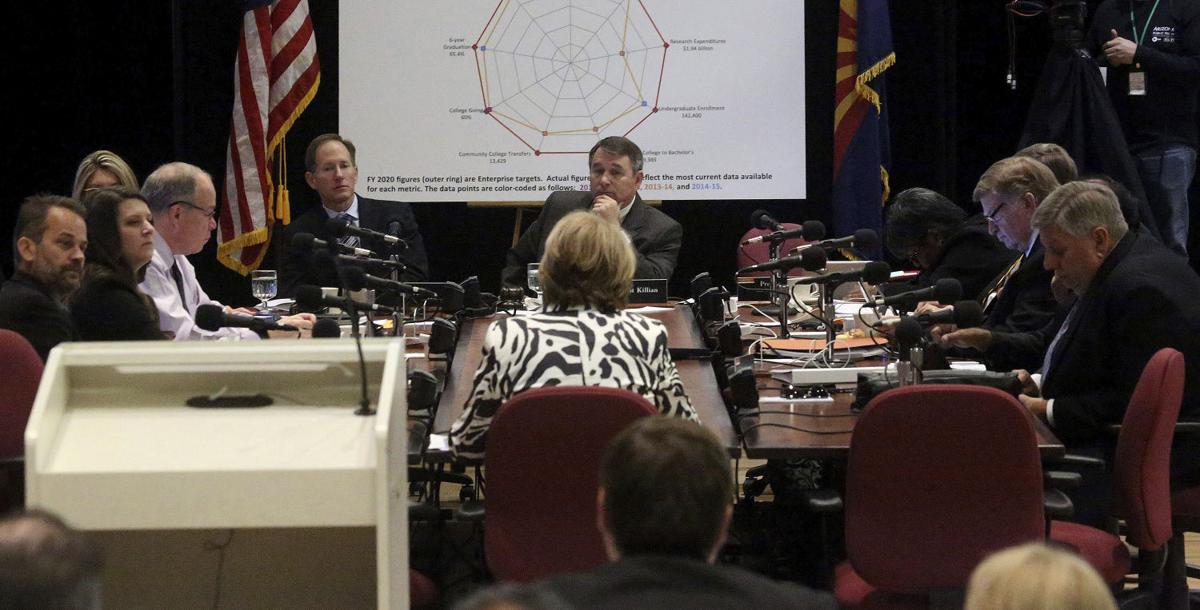PHOENIX — The Arizona Board of Regents voted Monday to settle claims that it illegally retaliated against the Arizona Students Association by withholding funds over a political difference.
Without admitting they did anything wrong, regents agreed to pay the association $250,000. That’s an estimate of the amount the students’ group contends the regents illegally withheld.
In exchange, the association will not pursue other funds it claims it may be owed.
The association also will not challenge a 2013 state law that permanently changed how the association is funded and undermined its major source of cash, said its attorney, Stephen Montoya.
He said association members concluded it was time to move on. “They learned that they needed to get over it and look at other methods of funding,” Montoya said. That means convincing students at the three state universities to join the association and pay a fee, as well as seeking outside grants.
“I think the regents realized they needed to work with and preserve ASA,” he said. “And ASA realized it needed to work with the Board of Regents. So both sides agreed to disagree and compromise so they could productively move on.”
In a prepared statement, the regents said they are pleased to resolve the differences with the students “and look forward to working together towards their common goals as they have done for many decades.”
The deal ends more than three years of litigation.
According to court records, the regents directly funded the association from 1974 through 1988.
That year, students voted to impose a $1-per-student fee each semester; it was increased, also by student vote, to $2 in 2008.
It was an “opt-out” system, meaning students who objected could request a refund.
All that changed in 2012 during the debate over Proposition 204, a measure on the Arizona ballot that would have made permanent a temporary 1-cent sales tax increase approved by state voters two years earlier. A large portion of the funds would have been earmarked for education, including some for the universities.
The ASA was involved in drafting the initiative. It collected more than 20,000 signatures to get the measure on the ballot, campaigned for it and used $120,000 of its student-fee income to promote its support.
All that was against the wishes of then-Gov. Jan Brewer, who also sat on the Board of Regents, which opposed the sales-tax measure. Several regents also criticized the association for its support of the ballot measure.
Shortly after the initiative failed, the regents called a special meeting where they suspended collection of the student fee and voted to withhold the income that already had been collected for the spring 2013 semester.
Several weeks later, the board had another special meeting, permanently changing its policies to collect the fee only from students who “opted in,” turning the “opt-out” policy on its head. The regents also voted to require the association to reimburse the universities for the administrative cost of collecting the fees.
Moreover, after implementing the opt-in policy, the board never remitted the fees already paid by students for the spring 2013 semester.
The association sued, charging that the regents’ action violated the association’s constitutional free-speech rights, “causing a chilling effect on ASA’s political speech” and depriving it of its only source of income.
A trial judge threw out the case, ruling that it was voluntary for the state to collect the fee and that the policy change wasn’t a First Amendment violation.
But in a ruling earlier this year a three-judge panel of the 9th U.S. Circuit Court of Appeals said the students did have a case.
Appellate Judge Richard Paez, writing for the court, acknowledged nothing in law required the Arizona Board of Regents (ABOR) to collect a fee from students to run the association and support its political activities.
“But having done so for 15 years at no cost, ABOR could not deprive ASA of the benefit of its fee collection and remittance services in retaliation for the ASA’s exercise of its First Amendment rights,” Paez wrote. He said the sudden change by the governmental agency in depriving the association of the benefits of the free collection was “sufficiently valuable to give rise to a retaliation claim.”
Monday’s settlement means that claim won’t go to trial. It does not mean, however, the regents will start collecting the fee again.
After the regents first acted, the Arizona Legislature voted to bar universities from collecting the fee.





